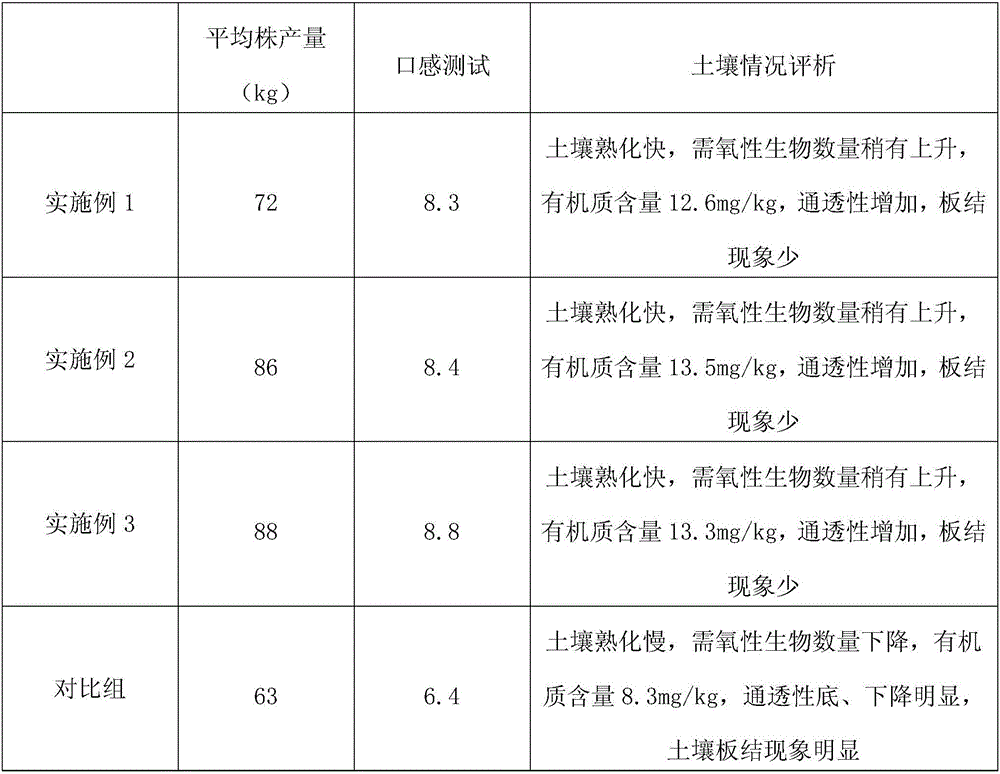Method for planting Taiwan lemon
A planting method and lemon technology, which are applied in fertilization methods, preparation of organic fertilizers, fertilizers made from biological wastes, etc., can solve the problems of slow growth rate and low yield of lemons, achieve obvious degradation and hardening phenomena, and enhance soil fertility. , the effect of increased ventilation
- Summary
- Abstract
- Description
- Claims
- Application Information
AI Technical Summary
Problems solved by technology
Method used
Image
Examples
Embodiment 1
[0037] A planting method of Taiwan lemon, comprising the following steps:
[0038] a. Soil selection and preparation: first select a soil with deep soil, rich in organic matter, and a slope of less than 18° as the plantation land for Taiwanese lemons. Deep plow the land and mature the land in the winter before planting. After the beginning of spring in the second year, turn over again Plow once, dry the soil for 3 days, then level the furrows, the height of the furrows is 55cm, and the plane width of the furrows is 170cm. Finally, dig the planting holes of Taiwan lemons on the plane of the furrows, dig 55 planting holes per mu, and plant the Taiwan lemons. The hole specification is 0.35m×0.35m in side length×depth; among them, the furrow plane is set from low to high.
[0039] Among them, the following raw materials are used in the mature land: 200 kg of straw, 120 kg of decomposed poultry manure, 30 kg of slaked lime, 0.3 kg of straw decomposing agent, 0.8 kg of actinomycetes...
Embodiment 2
[0049] A planting method of Taiwan lemon, comprising the following steps:
[0050] a. Soil selection and preparation: first select a soil with deep soil, rich in organic matter, and a slope of less than 18° as the plantation land for Taiwanese lemons. Deep plow the land and mature the land in the winter before planting. After the beginning of spring in the second year, turn over again Plow once, dry the soil for 6 days, then level the furrow, the height of the furrow is 75cm, and the plane width of the furrow is 190cm, and finally dig Taiwan lemon planting holes on the furrow plane, dig 70 planting holes per mu, and plant the Taiwan lemon The size of the hole is 0.5m×0.5m in side length×depth; among them, the furrow plane is set from low to high.
[0051] Among them, the following raw materials are used in the mature land: 400 kg of straw, 250 kg of decomposed poultry manure, 60 kg of slaked lime, 1.5 kg of straw decomposing agent, 2.8 kg of actinomycetes and 2.0 kg of phospho...
Embodiment 3
[0061] A planting method of Taiwan lemon, comprising the following steps:
[0062] a. Soil selection and preparation: first select a soil with deep soil, rich in organic matter, and a slope of less than 18° as the plantation land for Taiwanese lemons. Deep plow the land and mature the land in the winter before planting. After the beginning of spring in the second year, turn over again Plow once, dry the soil for 5 days, then level the furrows, the height of the furrows is 65cm, and the plane width of the furrows is 180cm. Finally, dig the planting holes of Taiwan lemons on the plane of the furrows, dig 60 planting holes per mu, and plant the Taiwan lemons. The hole specification is 0.42m×0.42m in side length×depth; among them, the furrow plane is set from low to high.
[0063] Among them, the following raw materials are used in the mature land: 300 kg of straw, 180 kg of decomposed poultry manure, 45 kg of slaked lime, 0.8 kg of straw decomposing agent, 1.8 kg of actinomycetes...
PUM
| Property | Measurement | Unit |
|---|---|---|
| Length | aaaaa | aaaaa |
Abstract
Description
Claims
Application Information
 Login to View More
Login to View More - R&D
- Intellectual Property
- Life Sciences
- Materials
- Tech Scout
- Unparalleled Data Quality
- Higher Quality Content
- 60% Fewer Hallucinations
Browse by: Latest US Patents, China's latest patents, Technical Efficacy Thesaurus, Application Domain, Technology Topic, Popular Technical Reports.
© 2025 PatSnap. All rights reserved.Legal|Privacy policy|Modern Slavery Act Transparency Statement|Sitemap|About US| Contact US: help@patsnap.com

